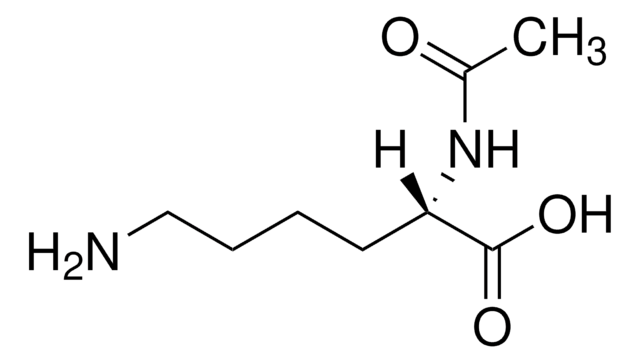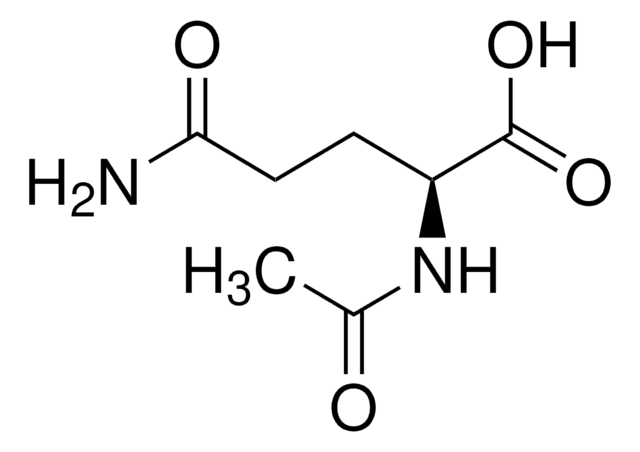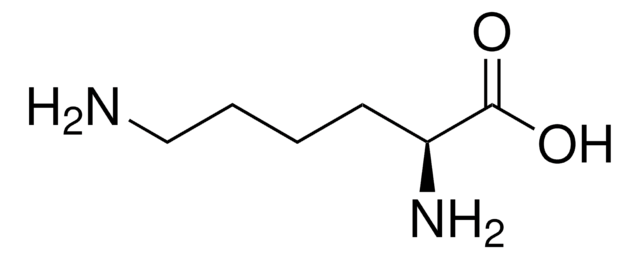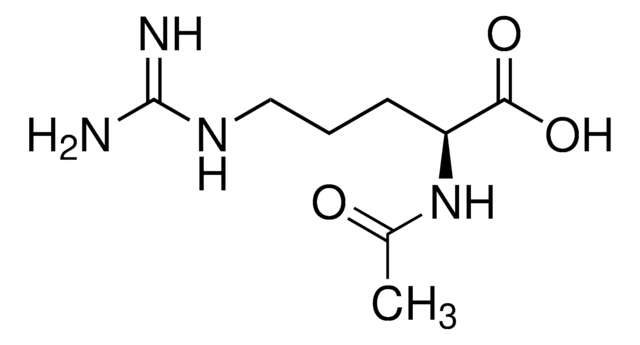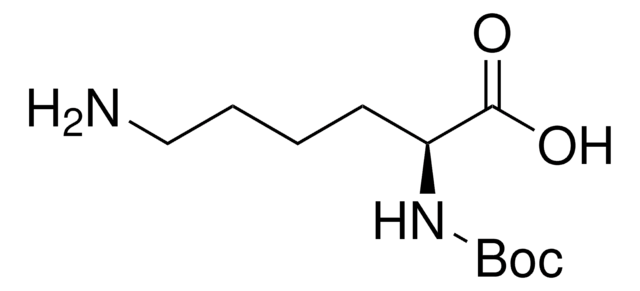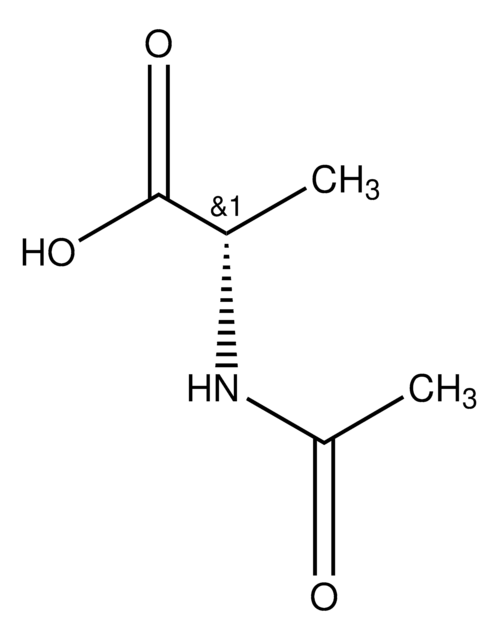A4021
Nε-Acetyl-L-lysine
Sinônimo(s):
N6-acetyl-L-lysine
Faça loginpara ver os preços organizacionais e de contrato
About This Item
Fórmula linear:
CH3CONH(CH2)4CH(NH2)CO2H
Número CAS:
Peso molecular:
188.22
Número CE:
Número MDL:
Código UNSPSC:
12352200
ID de substância PubChem:
NACRES:
NA.26
Produtos recomendados
Ensaio
≥98% (TLC)
Nível de qualidade
Formulário
powder
concentração
50 mg/mL in 80% acetic acid
cor
colorless to white
pf
250 °C (dec.) (lit.)
temperatura de armazenamento
−20°C
cadeia de caracteres SMILES
CC(=O)NCCCC[C@H](N)C(O)=O
InChI
1S/C8H16N2O3/c1-6(11)10-5-3-2-4-7(9)8(12)13/h7H,2-5,9H2,1H3,(H,10,11)(H,12,13)/t7-/m0/s1
chave InChI
DTERQYGMUDWYAZ-ZETCQYMHSA-N
Procurando produtos similares? Visita Guia de comparação de produtos
Categorias relacionadas
Aplicação
- Nε-Acetyl L-α Lysine Improves Activity and Stability of α-Amylase at Acidic Conditions: A Comparative Study with other Osmolytes. This study highlights the use of Nε-Acetyl-ʟ-lysine in enhancing the functional stability and activity of α-amylase under acidic conditions, demonstrating its potential as a valuable additive in industrial enzyme applications (Joghee et al., 2020).
Ações bioquímicas/fisiológicas
Nε-Acetyl-L-lysine (L-AcK) is an R-chain N-acetylated α amino acid used together with other lysine analogues to differentiate and characterized various aminoacylases and regulator 2 (Sir2) enzymes/sirtuins.
Código de classe de armazenamento
11 - Combustible Solids
Classe de risco de água (WGK)
WGK 3
Ponto de fulgor (°F)
Not applicable
Ponto de fulgor (°C)
Not applicable
Escolha uma das versões mais recentes:
Já possui este produto?
Encontre a documentação dos produtos que você adquiriu recentemente na biblioteca de documentos.
Os clientes também visualizaram
Yana Cen et al.
Journal of the American Chemical Society, 132(35), 12286-12298 (2010-08-20)
Sirtuins are protein-modifying enzymes distributed throughout all forms of life. These enzymes bind NAD(+), a universal metabolite, and react it with acetyllysine residues to effect deacetylation of protein side chains. This NAD(+)-dependent deacetylation reaction has been observed for sirtuin enzymes
J A Cohn et al.
Archives of biochemistry and biophysics, 328(1), 158-164 (1996-04-01)
We have previously shown that incubation of the model protein glucose-6-phosphate dehydrogenase (Glu-6-PDH) from the bacterium Leuconostoc mesenteroides with 4-hydroxy-2-nonenal (HNE), a major product of lipid peroxidation, results in the formation of cross-linked protein. HNE-modified protein is resistant to proteolytic
Jarrod B French et al.
Biochemistry, 47(38), 10227-10239 (2008-08-30)
Sirtuins are NAD (+)-dependent enzymes that deacetylate a variety of cellular proteins and in some cases catalyze protein ADP-ribosyl transfer. The catalytic mechanism of deacetylation is proposed to involve an ADPR-peptidylimidate, whereas the mechanism of ADP-ribosyl transfer to proteins is
S L Hazen et al.
The Journal of biological chemistry, 273(9), 4997-5005 (1998-03-28)
We have recently demonstrated that neutrophils oxidize nearly all of the amino acids commonly found in plasma to a corresponding family of aldehydes in high yield. The reaction is mediated by hypochlorous acid (HOCl), the major oxidant generated by the
A Pähler et al.
Chemical research in toxicology, 11(9), 995-1004 (1998-10-07)
Antibodies directed against chemical specific protein modifications are valuable tools to detect and comparatively quantify protein modifications. Both Nepsilon-(dichloroacetyl)-L-lysine and Nepsilon-(trichloroacety)l-L-lysine have been detected as modified amino acids in liver and kidneys of rats treated with perchloroethene (PER) after proteolysis.
Nossa equipe de cientistas tem experiência em todas as áreas de pesquisa, incluindo Life Sciences, ciência de materiais, síntese química, cromatografia, química analítica e muitas outras.
Entre em contato com a assistência técnica